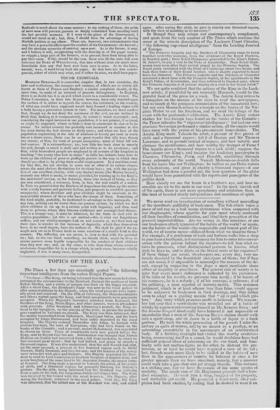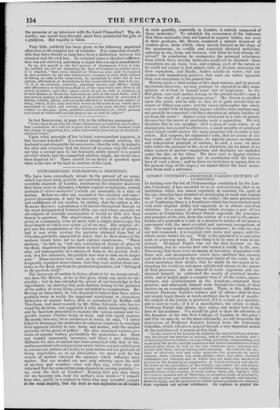We never read an investigation of swindling without marvelling at
the inordinate gullibility of tradesmen. The fish which takes a piece of red rag as a bait seems abstemious when compared with our shopkeepers, whose appetite for gain must utterly confound all their faculties of consideration, and blind their perception of the grossest improbabilities. Are we wrong in this inference, or are our tradesmen utterly ignorant of the habits of the world ? or again, are the habits of the world—the respectable and honest part of the world, we of course mean—different from what we imagine them ? For example, if a gentleman of rank and fortune walks into a shop to purchase a toothpick, is it customary for him to enter into conversation with the person behind the counter—to tell him what estates he possesses, what distinguished persons he knows, what style he lives in, and to dilate on the liberal scale of his expenses? If these things are usual, shopkeepers are, every day, very naturally deceived by the fraudulent imitations of them ; but if they are not usual, it is impossible to accountifor the success of the deceit, except by supposing in the dupe a most inordinate share either of stupidity or greediness. The general rule of society is to inter that every man's deficiency is indicated by his pretension. If he talks of his wealth, we presume him needy ; if he boasts of his company, he is a nobody ; if of his courage, a poltroon ; if of his gallantry, a man rejected of nursery-maids. This common judgment, which is at least oftener true than false, would appear to be unknown to tradesmen in their dealings, and they rather seem to adopt as a guiding maxim that " all is gold which glitters." Any story which promises profit is believed. We remember last year that a spirit-dealer was swindled out of a bottle of whisky by a person representing himself as Mr. SPRING RICE: ; and the homme d'esprit must really have believed it not impossible or improbable that a man of Mr. SPRING Ricies station should walk into a spirit-shop, and sit down to a bottle of liquor in it back parlour. He took the whole proceeding of the pseudo Under-Secretary as quite of course, and by no means as a prodigy, or an astounding eccentricity in the movements of an aristocratical body. If a farthing rushlight had visited this worthy credulous being, announcing itself as a comet, he would doubtless have had sufficient general ideas of astronomy on the one hand, and familiarity with low mutton-lights on the other, to distrust the pretension, or at least he would have required a view of its tail ; but, though much more likely to be skilled in the habits of men than in the appearances of comets, he believed at once a far greater miracle than we have imagined, namely, that a minister could walk into a gin-shop and get groggy therein. This instance is a striking one, but we have thousands of the same species of credulity. The single case of Mr. Hopkinson presents half a hundred examples. He went into a shop, bragged of his property, and forthwith got credit. He procured a frock-coat, after suspicion had been excited, by stating that he desired to wear it on
the occasion of an interview with the Lord Chancellor! The absurdity, one would have thought, must have penetrated the gills of a gudgeon. But cupidity is blind.



















 Previous page
Previous page